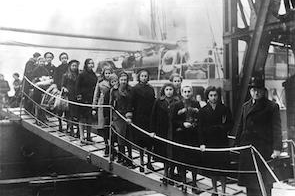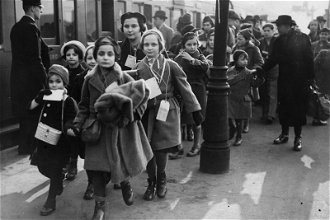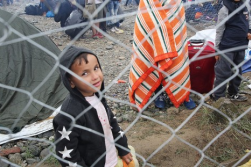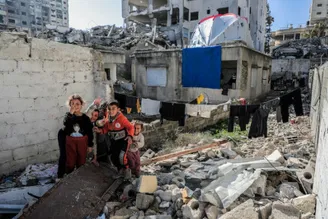Profile: Father Francis Wahle - refugee, priest, reconciler
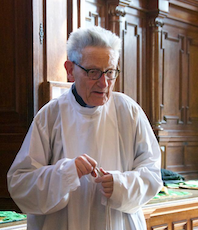
Fr Wahle - Image RCDOW
When Father Francis Wahle met King Charles recently, it capped this priest's extraordinary life, which included an escape from Nazi terror. The King was at Great Portland Street Synagogue in London on 9 November to commemorate the 85th anniversary of the Kindertransport, which brought 9,354 Jewish children from Germany, Austria and Czechoslovakia to safety in Britain. Fr Francis, who is now 94, was one of them. Today he is the oldest priest of Westminster Diocese.
When German forces swept into Austria in March 1938 and annexed the country, his life turned upside down. His Jewish father had converted to Catholicism earlier, with the result that Francis himself was a cradle Catholic, baptised in Vienna's famous St Stephen's Cathedral. Nazi racial laws paid no heed to that. With four Jewish grandparents he was deemed to be completely Jewish.
He remembers, "The Nuremberg laws now applied, and I was immediately chucked out of the diocesan Volksschule". His father was pensioned off from his post as a judge. His parents kept a brave face and tried to shield Francis and his sister from the persecution around them, but the young Francis sensed the tension. He saw the humiliation of Jews made to scrub the pavements.
His parents thought it best to let their children go to England, and on 12 January 1939 Francis and his sister Anne arrived at Liverpool Street station. He was only nine and half years old, she was seven. They were taken care of by the Catholic Committee for Refugees established by Cardinal Hinsley. Initially Francis went to Bankton House near Crawley Down in Sussex, a large country house lent to the Committee. His sister was in the care first of Ursuline nuns in Brentwood before going to the Sisters of Sion in Notting Hill Gate.
Fr Francis acknowledges that it was hard moving to a strange land and separated from his parents: "But I think we felt we just had to make the best of things and get on with it. We also had to concentrate on learning English quickly. I was even annoyed because in Vienna I had been reading books by Jules Verne and now I was being given stuff like Winnie the Pooh." He admits to being 'rebellious' and was sent away from his first school, a sign perhaps of inner turmoil otherwise not expressed.
Francis was given a free boarding place at Hodder, the preparatory school for Stonyhurst, and then later at Stonyhurst itself. At school he felt looked down on by the wealthier boys and "it didn't help that I wasn't good at sports". Francis had only sixpence a week pocket money and needed to pay for stationery and stamps. He resorted to selling the ration coupons for his sweets. Comments were made about Jews and moneymaking.
Despite the war, initially he and his sister were able to exchange terse 40-word messages with their parents through the Red Cross until 1942 when communication ceased. Francis wondered what had become of his parents, but kept his head down and concentrated on his studies. It helped that during the holidays he and two other refugee boys boarded with a woman in Blackpool with no children of her own who treated them well. She was "one of those Lancashire Catholics not afraid of voicing her faith." His sister was able to visit.
In the summer of 1945 came the wonderful news that his parents had survived by going underground in Vienna. The children were back in communication with their parents. Post-war travel disruption meant that they did not meet with their mother until 1947, and even then only briefly. But in the following years Francis and Anne went to Austria. He was almost a stranger to his parents and it took time and patience to build up their relationship again. He had gone into exile as a nine-year-old boy and now he returned as a young man of nearly 20.
Gradually Francis learned how his parents had survived even though the Gestapo were looking for them. He told me, "Using false papers they moved constantly from one boarding house to another, with the story that they were lovers who needed a place for a short while. It appealed to the sentimentality of the Viennese.
"They ate in cafes with two entrances: if the Gestapo came in one door, they would leave quietly through the other." No immediate relatives died in the Holocaust, except an aunt. Seeing no other way out, she committed suicide in 1940.
After the war his father was restored to his post as a judge. Anne moved back to Vienna and entered the Sisters of Sion as Sister Hedwig. She dedicated her life to promoting Jewish-Christian understanding, in both Austria and Britain. Sister Hedwig organised tours to Israel, established a library on Christian/Jewish topics, and worked to ensure that textbooks were free of antisemitism. She died in 2001. Francis' mother died in 1957, his father in 1970.
Francis graduated with a degree in economics from University College, London and then qualified as an accountant. He was active in his parish in London and spoke in the open air for the Catholic Evidence Guild. He was set on fulfilment through a family of his own until one day a priest challenged him: "Why aren't you a priest?" He was sent to the English College in Rome. It was the time of the Second Vatican Council, which he remembers as an exciting time when a new future for the Church seemed to open up. Some of their lecturers were periti, consultants at the Council. Their students were kept well informed about developments.
After six years in Rome, Francis was ordained for the Diocese of Westminster in 1965, where over the years he would be parish priest at three parishes, one of them, Enfield, among the biggest and busiest in the diocese. Even in retirement he continued pastoral work. He made it known that he would be available to meet people who had left the Church because it had hurt them in some way. His ministry of listening enabled some of them to be reconciled.
Until recently Fr Francis also went monthly to celebrate Mass for the German community in Richmond, southwest London, where families live near a German School. They would invite him to lunch, and now they, a new generation, could ask him about his family's experience of escaping genocide.
This led me to ask if he felt Jewish. After all, he had been torn from his family at an early age, and his parents had to go into hiding, all because of their Jewish descent. He replies: "I'm like a tree with two roots - my Christian roots, my religion; and my Jewish roots, my ancestors. I can make the Catholics less anti-Semitic and the Jews less afraid of Catholicism." I ask what message he draws from his experiences. Like others on the Kindertransport he has been interviewed on behalf of the Association of Jewish Refugees, to record his memories. In reply he offers me some words he gave to the AJR interviewer:
"I have thought about it quite a bit and came to the conclusion that I don't have a message for future generations. We know what we ought to be doing, but we don't do it. We haven't learnt from the past."



